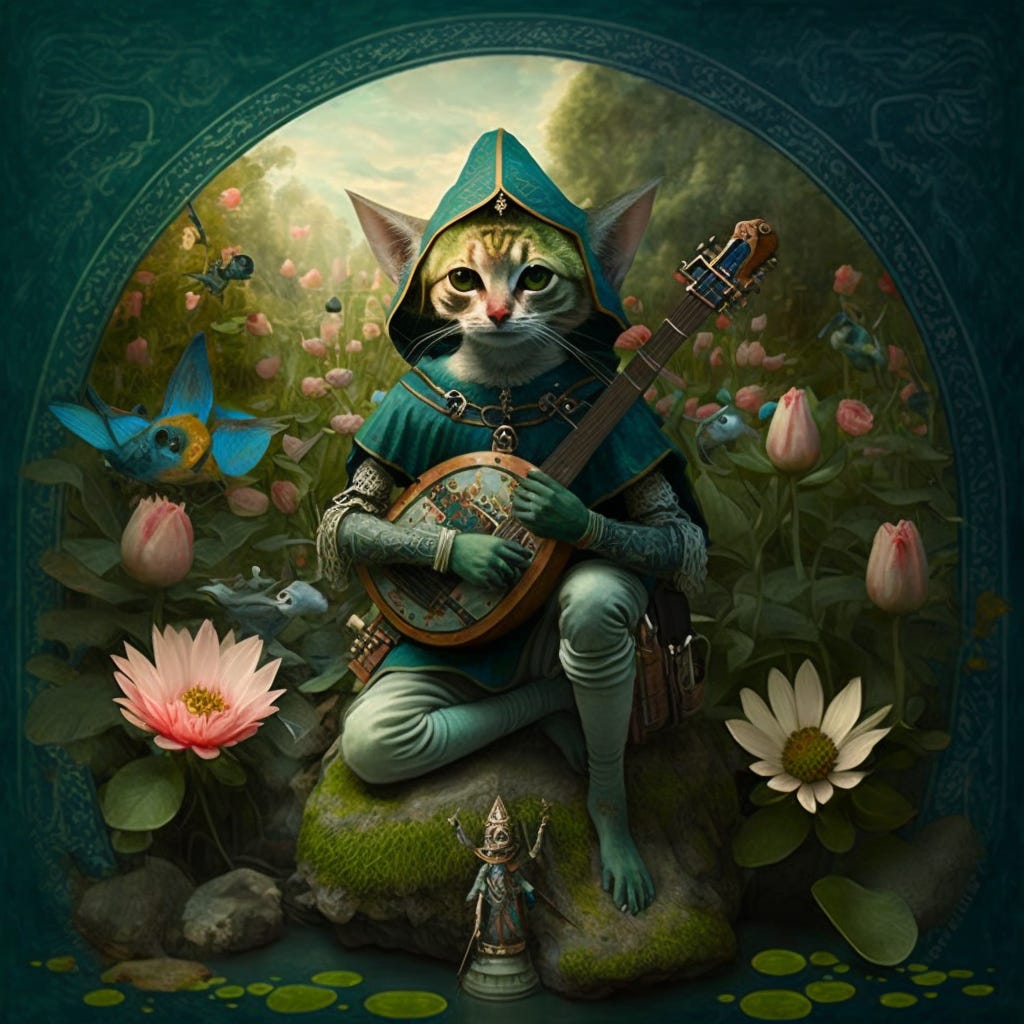🌀🗞 The FLUX Review, Ep. 80
December 22nd, 2022
Episode 80 — December 22nd, 2022 — Available at read.fluxcollective.org/p/80
Contributors to this issue: Dimitri Glazkov, Erika Rice Scherpelz, Scott Schaffter, Justin Quimby, Neel Mehta
Additional insights from: Ade Oshineye, Gordon Brander, a.r. Routh, Stefano Mazzocchi, Ben Mathes, Boris Smus, Alex Komoroske, Robinson Eaton, Spencer Pitman, Julka Almquist, Lisie Lillianfeld, Samuel Arbesman, Dart Lindsley, Jon Lebensold
We’re a ragtag band of systems thinkers who have been dedicating our early mornings to finding new lenses to help you make sense of the complex world we live in. This newsletter is a collection of patterns we’ve noticed in recent weeks.
“Year’s end is neither an end nor a beginning but a going on, with all the wisdom that experience can instill in us.”
— Hal Borland
❄️📝 Editor’s note: We’ll be off next week for the holidays. We’ll see you again in the first week of the new year!
2️⃣0️⃣2️⃣2️⃣ What a year
In this final episode of 2022, we look back on a year of ideas we shared with you, dear readers.
We explored the curious juxtaposition of variety and the unvarying infrastructure it relies on.
We talked about the social engine and the troubling loss of lubrication within it.
We suggested choosing strategic dance partners carefully, looked for places where strategy hides, and learned with you about “jootsing.”
We delved into the nuanced topic of interaction between top-down guidance and bottom-up enthusiasm in organizations. We hinted that fuzzy planning might actually be valuable in ambiguous situations.
We spent a bunch of time talking about lenses. We looked at their powers and limitations, how they sometimes manifest as strong emotions, and how often we can’t even see them. We built up the idea of lens hygiene and pointed out that lenses tend to become crutches.
Speaking of lenses, we presented an “I would simply…” lens that reads as nearly prophetic given recent events.
We had a lot of fun with the ship of Theseus metaphor.
Sometime mid-year, we revealed the creative writing process behind our episodes.
We introduced the concept of a strategic hope, based on one of our favorite movies, and poked at the weird effects of quiet majorities and vocal minorities.
We marveled at the power of stories, articulated the danger of the mismatch between the inner and outer stories, and how the inner stories of an organization can act as its straitjacket. We also described the challenge of capturing complex concepts in a few words, as well as the healing power of kintsugi narratives. We urged you to make spaces for divergent conversations.
We dusted off the safe-to-fail experiments framework and discussed how to distinguish maps, guidebooks, and guides.
We wrote an appreciation for Christopher Alexander (1936–2022).
We tried to just sit with it, pointed at blind spots, spent a bit of time enjoying the concept of kayfabe, and introduced a framework for thinking about ambiguity.
We discussed analysis paralysis and mental model shortcuts and implored our readers to come up with a mental model tooling breakthrough. We even had a Halloween-themed story about wicked problems and a spooky story about fear.
We wrote an entire episode in collaboration with Large Language Models — before they became cool (and then uncool again).
Most of all, we loved writing these stories together and sending them out to you. Here’s to 2023 and all the crazy, weird, wonderful stories to come.
🖼🤩 Delightful pictures and how to create them
A special holiday section! We’ve enjoyed playing with generative AI image models like Midjourney in our Discord server, and along the way we’ve found some prompt snippets that can yield absolutely delightful results. Here are a couple of those phrases and examples of the incredibly compelling (and often hilarious) things they produce.
1. “On the cover of X” makes for a fantastic prompt
2. “As a technical diagram” (and “--niji”, which adds an anime style)
3. “In the style of X”
4. “Chiaroscuro” adds contrast and drama
⛄⏳ Worth your time
A wintry-themed spin on our usual section.
The Science Behind Why No Two Snowflakes Are Alike (Wired) — Scientists describe the chemistry and physics behind snowflakes’ intricate crystalline shapes. The adage that no two are alike is a great example of chaos theory: each snowflake is subjected to endlessly varying micro-conditions, and even small tweaks to the initial conditions lead to very different final crystals.
Hygge: A Heart-Warming Lesson From Denmark (BBC) — Explains the now-famous Danish tradition of “hygge,” loosely translated as “coziness of the soul.” In the midst of a dark, cold winter, there’s nothing quite like getting comfortable in a soft chair, relaxing, enjoying crackling fireplaces and good books, and spending time with friends and family.
Why Did the Earth Totally Freeze for 100 Million Years? (History of the Earth) — Describes the theorized causes of “Snowball Earth,” where the entire planet nearly froze for millions of years. Positive feedback loops led a small initial cooling to cascade into a massive deep freeze, but they also worked the other way: once volcanoes spewed enough carbon dioxide into the atmosphere, the greenhouse effect swiftly thawed the icy planet out.
A History of Rome Christmas (The History of Rome) — Recounts the ancient Roman roots of such classic Christmas traditions as gift-giving and caroling in the streets. It’s believed that the very date of December 25th stems from the Roman holiday celebrating Sol Invictus, which marked the “turning point” in the sun god’s battle against darkness, when the days finally started getting longer.
Dreidel, Dreidel, Dreidel… (Slate) — A humorous analysis of how long the average dreidel game (a Hanukkah favorite) takes to play, powered by 8.5 million simulated games. Computes an expected game length of 1 hour and 54 minutes, and quips that, “perhaps if you were waiting out a siege by the Seleucid Empire this would be ideal, but two hours is excessive if you’re just trying to kill 30 minutes before the latkes are ready.”
📚🎄 Book for your shelf
An evergreen book that will help you dip your toes into systems thinking.
This week, we recommend Parable of the Sower by Octavia Butler (1993, 345 pages).
Undeniably dystopian and dark, Parable of the Sower (book 1 of the Earthseed duology) is at the same time surprisingly hopeful in the way it shines a light on human perseverance. Octavia Butler presents us with a near-future story of a society in shambles due to climate change and economic collapse. Despite the constant disasters that befall the main character and her community, people keep going. With its philosophy of embracing change that you cannot control, this book still feels relevant (despite the fact that the “future” of the setting begins in 2024).
🕵️♀️🧊 Lens of the week
Introducing new ways to see the world and new tools to add to your mental arsenal.
This week’s lens: Stoicism and gratitude.
Your project didn’t get funding. You got rejected for that job. A promotion fell through. The economy is tanking. It’s abundantly easy to look for things that are not going well or as desired. The hedonic treadmill is real, and it’s hard not to forever strive for an impossible-to-achieve ideal.
There are, however, almost always some things to be grateful for — if we can find them. Stoicism has the concept of “negative visualization,” which asks us to imagine life without the things that we care about (and usually take for granted). For example, what if your child, spouse, sibling, job, or home wasn’t there? What if you lost one of your senses? So many things that add to our life we take for granted when we focus on the deficits. Taking a moment to be grateful for the things that add value and meaning to our lives won’t fix everything, but it can help counterbalance the gravity of the negative things we see.
© 2022 The FLUX Collective. All rights reserved. Questions? Contact flux-collective@googlegroups.com.





